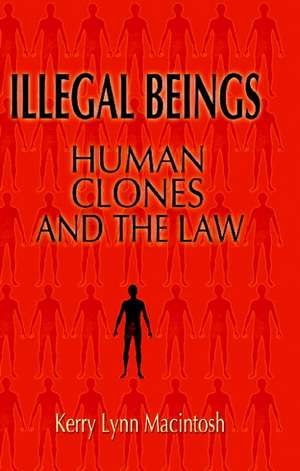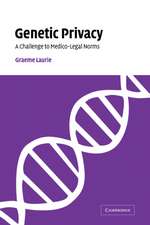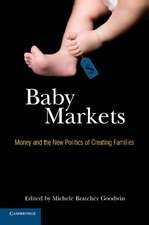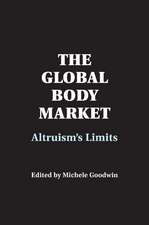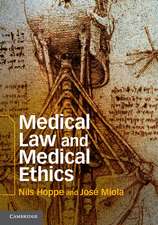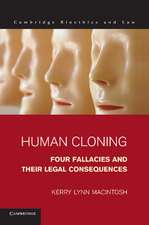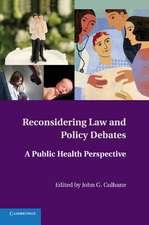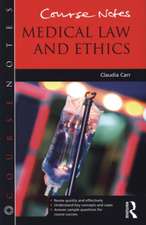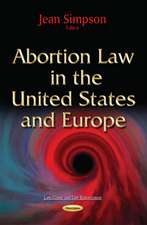Illegal Beings: Human Clones and the Law
Autor Kerry Lynn Macintoshen Limba Engleză Hardback – 31 iul 2005
Preț: 362.48 lei
Nou
Puncte Express: 544
Preț estimativ în valută:
69.38€ • 71.50$ • 58.57£
69.38€ • 71.50$ • 58.57£
Carte tipărită la comandă
Livrare economică 03-17 martie
Preluare comenzi: 021 569.72.76
Specificații
ISBN-13: 9780521853286
ISBN-10: 0521853281
Pagini: 286
Dimensiuni: 158 x 236 x 21 mm
Greutate: 0.59 kg
Editura: Cambridge University Press
Colecția Cambridge University Press
Locul publicării:New York, United States
ISBN-10: 0521853281
Pagini: 286
Dimensiuni: 158 x 236 x 21 mm
Greutate: 0.59 kg
Editura: Cambridge University Press
Colecția Cambridge University Press
Locul publicării:New York, United States
Cuprins
Introduction; Part I. Five Common Objections to Human Reproductive Cloning Reflect, Reinforce, and Inspire Stereotypes about Human Clones: 1. Does human reproductive cloning offend God and nature?; 2. Should children be begotten and not made?; 3. Do human clones lack individuality?; 4. Could human clones destroy humanity?; 5. Does human reproductive cloning harm participants and produce children with birth defects?; Part II. Anti-Cloning Laws Are Bad Public Policy: 6. What anti-cloning laws say and do; 7. The five objections have inspired anti-cloning laws; 8. Anti-cloning laws reflect a policy of existential segregation; 9. The costs of anti-cloning laws outweigh their benefits; Part III. Anti-Cloning Laws Violate the Equal Protection Guarantee and Are Unconstitutional: 10. Anti-cloning laws classify human clones and are subject to strict scrutiny; 11. Anti-cloning laws inflict judicially cognizable injuries that confer standing; 12. Anti-cloning laws violate the equal protection guarantee; Conclusion.
Recenzii
"Professor Kerry Macintosh's book is an intellectual tour de force that demolishes all the staid arguments against illegal cloning. Everyone should read this book; it is destined to be a classic." Gregory E. Pence, author, Who's Afraid of Human Cloning, Professor, School of Medicine and Department of Philosophy, University of Alabama at Birmingham
"In Illegal Beings, Kerry Macintosh offers a thought-provoking and ultimately persuasive case that there are serious constitutional doubts associated with banning human reproductive cloning. Her ultimate thesis-- that it is wrong to ban an entire class of human beings based on widely-held but unfounded fears associated with their potential existence-- should resonate powerfully with any American desirous of preserving an egalitarian society." Elizabeth Foley, Florida International University College of Law
"The most valuable contribution of Professor Macintosh's Illegal Beings may lie less in what it has to say about human cloning as such than in its exploration of the distinctive harms that laws restricting reproductive liberty can visit upon those whose very existence such laws seek to prevent -- not upon the parents whose freedom those laws constrain but upon the children whose being those laws condemn. Hers is a thought-provoking contribution to a constitutional conversation that is just beginning." Laurence H. Tribe, Harvard University
"Kerry Lynn Macintosh's new book is a thought-provoking contribution to a fascinating conversation about one of the most fundamental institutions in our society, and the ways in which technology shapes it and allows us to re-envision and re-imagine it." - The Law and Politics Book Review Zvi H. Triger, The College of Management, School of Law
"In Illegal Beings, Kerry Macintosh offers a thought-provoking and ultimately persuasive case that there are serious constitutional doubts associated with banning human reproductive cloning. Her ultimate thesis-- that it is wrong to ban an entire class of human beings based on widely-held but unfounded fears associated with their potential existence-- should resonate powerfully with any American desirous of preserving an egalitarian society." Elizabeth Foley, Florida International University College of Law
"The most valuable contribution of Professor Macintosh's Illegal Beings may lie less in what it has to say about human cloning as such than in its exploration of the distinctive harms that laws restricting reproductive liberty can visit upon those whose very existence such laws seek to prevent -- not upon the parents whose freedom those laws constrain but upon the children whose being those laws condemn. Hers is a thought-provoking contribution to a constitutional conversation that is just beginning." Laurence H. Tribe, Harvard University
"Kerry Lynn Macintosh's new book is a thought-provoking contribution to a fascinating conversation about one of the most fundamental institutions in our society, and the ways in which technology shapes it and allows us to re-envision and re-imagine it." - The Law and Politics Book Review Zvi H. Triger, The College of Management, School of Law
Notă biografică
Descriere
Discusses the pros and cons of laws against human reproductive cloning.
